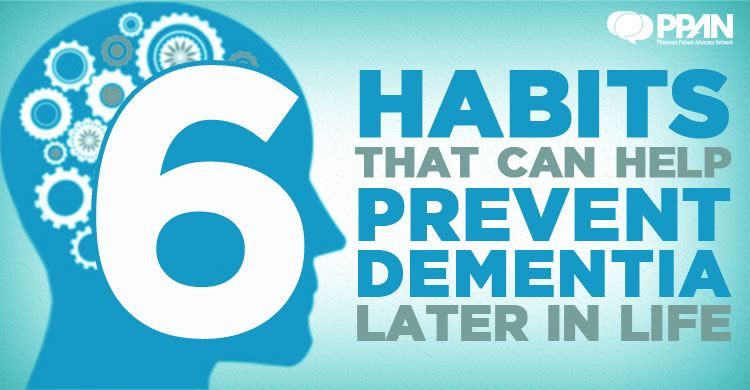6 Habits That Can Help Prevent Dementia Later in Life
As health care is expanding its recognition of the connection between lifestyle choices and health risks, much of the focus for services and care have also shifted to prevention and intervention in order to avoid the possible development of chronic and irreversible conditions. This is becoming highly applicable with elder populations, especially as the needs of this demographic continue to grow.
Beyond physical ailments that can develop later in life, cognitive function is also a strong concern for much of the adult population. Specifically, there are many worries about the development of dementias and memory loss which can greatly impair quality of life through the later years. Further, early onset dementias also cause a concern, as these can become apparent as early as in a person’s 40s or 50s.
Mental Conditions Related to Dementia
There are several important points to consider about dementia. The term is a general reference to a conglomerate of conditions which can cause mental impairment. These conditions tend to marked by:
- Confusion
- Long and short term memory loss
- Lack of cognitive focus
- Difficulty in adapting or learning new skills
- Aggression
- Lack of recognition of familiar people and things
- Paranoia
- Inability to follow a realistic time continuum
This makes dementias far more than simple forgetfulness, as they can also indicate a physical decline within the brain, either in neurotransmitter production or in neuronal connections.
Memory Issues and Dementia
It is also necessary to realize that while memory issues are a symptom of dementia, it is not always the primary one. Studies indicate that memory formation and storage is far more complex than may have been thought.
Most traditional theories on memory and cognition considered specific areas of the brain responsible for tasks such as learning and memory formation. However, it has become accepted that it is the actual pathways to bits of information which are responsible for memory retrieval, and that the information itself may be stored in various areas of the brain.
With dementias, these neural pathways become compromised and that is what provides the symptom of memory loss. However, individuals can also train their minds to use alternative pathways to access at least parts of memories, and this is one reason that people with dementias may appear quite lucid, although they are still suffering from the condition.
This also means that there are steps individuals can take throughout the course of their life in order to reduce the chances of developing dementia. Many of the points involve simple lifestyle changes and activities that can build neurplasticity, which allows the brain to form new and different pathways for information retrieval.
Healthy Eating and Natural Supplements
One important point to bear in mind is that the brain requires an extremely high nutrient content in the cells in order to function properly. Fats, such as omega 3 fatty acids, and glucose are the main fuel that the brain requires. The glucose is responsible for cell metabolism and function, while omega 3 fatty acids support the proper production of acetylcholine, which protects nerves by forming a sheath around the fibers, and also aid in the transmission of messages from the brain to the body.
Not only are many diets entirely lacking in health sources for these nutrients, but modern food consumption also fills the body with veritable toxins which can actually attack the nerve endings and cause oxidation in the brain. Changing the diet to one that is higher in whole foods, especially whole grains, and simply reducing the consumption of processed foods can have a positive effect on its own. However, also focusing on supplements and food that support brain health and function can also provide lasting wellness benefits.
While omega 3 fatty acid supplements can be taken in capsule form, there are also food sources that supply this vital nutrient:
- Flaxseeds
- Cold water fish, especially salmon, mackerel, and herrings
- Walnuts
- Avocados
- Eggs
Although other natural foods can supply some omega oils, these sources are the highest per volume.

Exercise and Mental Function
Exercise also plays a dual role in helping to prevent the onset of dementias. From a purely physical standpoint, greater activity also increases the body’s metabolism which further stimulates more effective circulation. This means that the brain is able to receive greater amounts of oxygen, which also allows it to process glucose and other nutrients more efficiently. In this manner, exercise can support the physical function of the brain, which also improves cognitive output.
It should further be noted that exercise can also reduce emotional stress and provide a positive channel for gaining better mind body awareness. This also supports healthy brain function based on psychological factors.
Mental Stimulation and Dementia
One of the common sayings about cognitive function is that if you don’t use it, you lose it. This refers to the fact that our organ systems can fall into the pattern of habits just as easily as people can. The more the brain is stimulated by new experiences, continuing education, and mental challenges, the more likely that it will be able to form various neural pathways to access information. Thus, by challenging the mind, people are also able to use their mental abilities more effectively and for longer spans of life.
Good Sleep Habits Impact Brain Health
The importance of good sleep habits is another issue that is being recognized for its connection to reducing possible risk factors for chronic ailments. With brain health, the mechanism behind this is similar to the way poor sleep impact the entire body. Proper rest not only gives the brain a chance to physically balance and repair, but it also provides a psychological outlet to stressors. This combination also supports better health through life.
Staying Actively Social Keeps People Sharp
Socialization is also important to cognitive and mental health. This is partially because interpersonal relationships are constantly forming new experiential memories, but also because the stimulation of interaction causes people to gain greater focus. These factors also fall under the concept of how neuroplasticity can strengthen cognitive and brain function.
Manage Stress for Mental Health
Stress management is highly important, especially because it can relate to all the other positive habits that prevent mental decline. The effects of this are also dual, in that excess stress can affect physical function by over utilizing nutrients, but also because stress can cause psychological isolation. By managing stress, it give both cognitive and emotional functions the chance to thrive.





